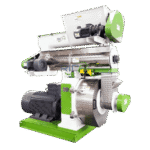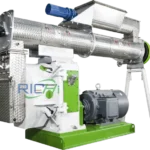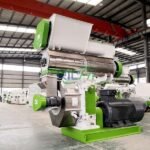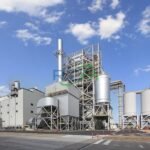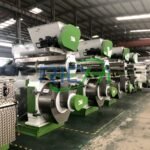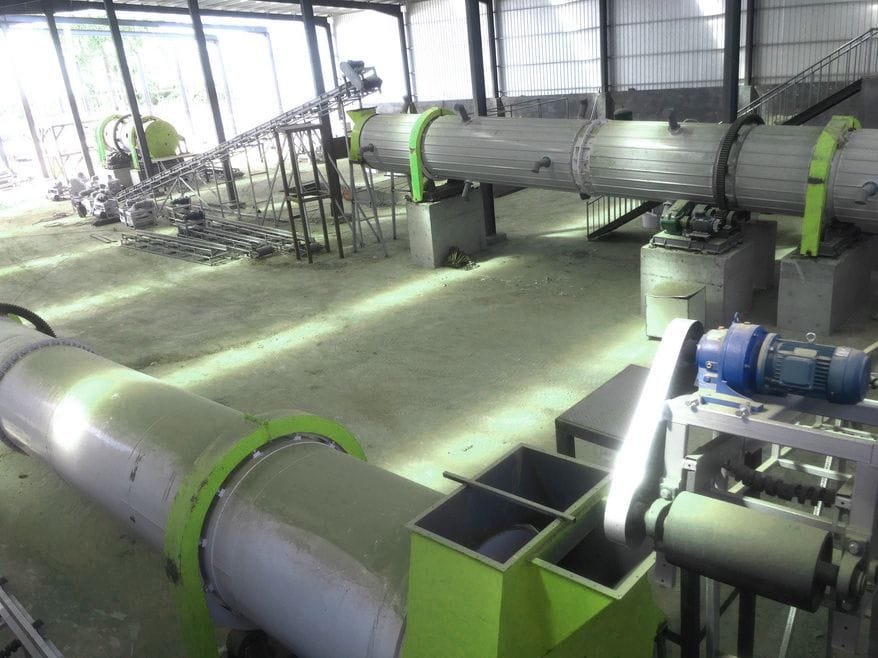Ring die pellet machines are specialized equipment designed to convert raw materials, such as biomass, wood, and feed, into compact pellets. These machines feature a distinctive ring die shape which influences their name and functionality. Within the industrial sector, they are widely recognized for their efficiency in mass production.
The heart of the ring die pellet machine lies in its robust design, which is comprised of three main components: the ring die itself, the rollers, and the feeder system. These elements work in unison to facilitate the continuous machining process, ensuring high throughput and consistency.
The primary role of the ring die is to shape the raw material into pellets. Made of sturdy metals to withstand intense pressure and friction, the ring die accommodates an array of pellet sizes determined by the dies, thereby offering versatility in production.
The rollers, usually two or more, rotate within the ring die, pressing and forcing the material through the die holes, creating pellets. Meanwhile, the feeder plays a crucial role in regulating the material flow, ensuring even distribution and preventing blockages.
Given their capacity to handle diverse materials, ring die pellet machines find applications across various industries. In biomass production, they convert residues like sawdust, straw, and husk into energy-dense pellets used for heating and power generation.
In the agricultural sector, these machines transform feedstock into compact, nutrient-rich pellets, optimizing feed efficiency. Furthermore, wood processors utilize ring die pellet mills to produce high-quality wood pellets for residential or industrial use.
The versatility of ring die pellet mills combined with their capability to produce uniform and durable pellets makes them indispensable in numerous fields. They accommodate large-scale production demands while maintaining output quality and efficiency, cementing their status as a cornerstone in the pellet production landscape.
Benefits of a Ring Die Pellet Machine
Ring die pellet machines offer superior efficiency compared to their flat die counterparts. A key benefit lies in their ability to produce a higher volume of pellets per hour, which significantly improves operational productivity. These machines are engineered to handle heavy loads, resulting in increased throughput. This enhanced efficiency aids in meeting high demand without compromising on quality.
The durability of ring die pellet machines cannot be overstated. Built with robust construction materials, these machines are designed for long-term, heavy-duty operation. Their structural integrity ensures they can withstand the constant strain of pellet production, making them a reliable choice for businesses looking for longevity and reduced maintenance concerns.
The consistency in pellet quality produced by ring die pellet mills is another significant advantage. These machines are equipped with precise mechanisms that ensure pellets have uniform size and density. This uniformity is critical, particularly in applications requiring exact specifications, such as animal feed or biomass fuel. The high-quality output from ring die pellet mills translates to better performance and efficiency in the end-use applications.
Energy consumption is a crucial factor in any manufacturing process, and ring die pellet machines are designed with this in mind. They are optimized to use energy efficiently, which can lead to substantial reductions in operational costs. This energy efficiency does not only mean lower electricity bills but also supports sustainable production practices, contributing to an overall positive environmental impact.
Scalability is a notable feature of ring die pellet machines. They are versatile and can be adapted to suit a range of production scales—from small, artisanal operations to large-scale industrial facilities. This flexibility makes them an attractive option for businesses at various growth stages, ensuring that as demand increases, the production capacity can be seamlessly scaled up without requiring a complete overhaul of existing machinery.
Why Choose a Ring Die Pellet Machine?

Ring die pellet machines are highly versatile, accommodating a wide range of feedstocks such as wood, biomass, and animal feed. Their design allows them to efficiently process various raw materials, making them ideal for diverse applications. Whether producing pellets for fuel, feed, or other purposes, ring die pellet machines offer adaptability that meets different industrial needs, thereby enhancing their appeal across multiple sectors.
From a cost-effectiveness perspective, ring die pellet mills provide significant long-term savings. These savings are primarily due to their lower energy consumption and reduced maintenance requirements.
Advanced manufacturing techniques and materials have considerably increased the lifespan of key components, thus diminishing the frequency and cost of servicing. Over time, this makes them a financially prudent choice for businesses seeking to optimize operational expenditure.
High output is another compelling reason to choose a ring die pellet machine. These machines are engineered for high production rates, enabling efficient operations at large scales. The consistent, high-quality output is a result of better compression and pelletization processes, which are hallmarks of ring die technology.
Compared to flat die pellet mills, ring die machines provide superior throughput, making them suitable for industrial applications that necessitate high-volume processing.
Technological advancements in ring die pellet machines have significantly enhanced their performance. Modern ring die pellet mills are equipped with sophisticated control systems, automated feeding mechanisms, and advanced cooling solutions.
These innovations not only improve efficiency but also ensure the production of pellets with uniform density and durability. The integration of cutting-edge technology facilitates better monitoring and control, thereby optimizing the production process.
Reliability is a critical factor in manufacturing and agriculture industries, where continuous operation is often required. Ring die pellet machines are renowned for their robustness and durability, delivering consistent performance even under rigorous working conditions.
This reliability ensures continuous, high-quality pellet production, minimizing downtime and operational disruptions. Consequently, investing in a ring die pellet mill is synonymous with a dependable and efficient pelleting process.
Working Principle of a Ring Die Pellet Machine
The ring die pellet machine commences its operation with the material feeding stage. Raw materials, such as biomass or feed, are systematically introduced into the machine through a feeder. This feeder ensures a continuous, controlled flow, maintaining a steady supply of material to the key operating parts of the machine. The consistency in material input is crucial for efficient and uniform pellet production.
Once the raw material enters the machine, it undergoes compression. This involves the action of the ring die and a set of rollers. The evenly spaced rollers exert significant pressure on the material, forcing it against the ring die. This pressure compacts the material tightly, preparing it for the subsequent extrusion phase. The effectiveness of the compression process is instrumental in achieving high-density, durable pellets.
Following compression, the process moves into extrusion. During this stage, the compacted material is pushed through the die holes in a manner similar to an extrusion process. The holes in the ring die determine the diameter of the produced pellets. As materials push through these perforations, they take on a cylindrical form. The consistency and size of the die holes directly affect the quality of the final pellets.
After extrusion, the formed pellets require a cooling and cutting procedure. This cooling and cutting phase is essential to solidify the pellets and stabilize their structure. As the hot and freshly extruded pellets are directed through a cooling system, they regain rigidity. Simultaneously, a cutting mechanism slices the elongated pellets to the desired length, ensuring uniformity in size.
The final step in the working principle of a ring die pellet mill is the collection. Once the pellets have been properly cooled and cut, they are directed towards collection bins or conveyors. These system components facilitate the organized gathering of finished pellets.
Subsequent to collection, the pellets may be packed for storage or transportation depending on their intended application, thus completing the ring die pellet machine’s operational cycle.
Specific Parameters of a Ring Die Pellet Machine
Ring die pellet machines, also known in the industry as ring die pellet mills, have various parameters that significantly influence their operation and output quality. Understanding these parameters is critical for selecting the right machine for specific needs.
One of the primary parameters is the die diameter. Die diameters for ring die pellet machines typically range from 350mm to 800mm or more, depending on the model. The die diameter directly impacts both the size of the pellets produced and the machine’s overall capacity. Larger die diameters allow for the production of larger pellets and often enable the machine to achieve higher output capacities. Conversely, smaller die diameters are suitable for producing finer pellets, often required in applications such as animal feed production.
Another crucial parameter is the roller design. Rollers come in various designs, including smooth and corrugated surfaces, which play a significant role in the material compression process. The design of the rollers affects the uniformity and density of the pellets. Smooth rollers are generally used for softer materials, ensuring consistent pellet quality, while corrugated rollers are preferred for harder, more fibrous materials, providing better grip and enhanced compression.
Power consumption is an essential consideration. Ring die pellet machines demand varying power requirements based on their size and capacity. Motor specifications generally range from 55 kW to 315 kW, with larger machines requiring more power to drive both the die and rollers effectively. Efficient energy use is crucial for minimizing operational costs and maximizing production efficiency.
Finally, the output capacity of ring die pellet mills can differ significantly across models. Production capacities typically range from 800 kg/h to several tons per hour. This variability allows businesses to select models that match their production demands, from small-scale operations to large industrial settings. The ability to produce consistent production rates is vital for maintaining supply chain efficiency and meeting market demands.
Suitability of Ring Die Pellet Machines for Different Customers
Ring die pellet machines, also known as ring die pellet mills, are highly versatile and serve a wide spectrum of customers, ranging from large-scale industries to small businesses and agricultural sectors. This section explores how different customer groups can benefit from employing these robust machines in their operations.
Large-Scale Industries: For extensive industrial operations, the advantages of ring die pellet machines are considerable. These machines are designed to manage high output demands, making them ideal for industries that require extensive production capabilities.
The efficiency of ring die pellet mills ensures that these industries can produce large quantities of pellets consistently and relatively quickly. Additionally, the durability and longevity of these machines reduce downtime and maintenance costs, further enhancing overall productivity and profitability.
Medium-Sized Enterprises: Medium-sized businesses can effectively leverage ring die pellet machines due to their scalability. As these enterprises aim to expand, ring die pellet mills offer flexible solutions that can grow with their production needs.
These machines can be adjusted or multiple units can be added to accommodate increasing demands, offering an efficient way to scale operations without substantial initial investment or significant disruptions to current workflows.
Small Businesses: Smaller models of ring die pellet machines provide a cost-effective option for small business operations. These models maintain the core benefits of the larger machines while being more affordable and manageable for businesses with limited production needs and budgets.
By utilizing smaller ring die pellet mills, small businesses can enhance their production efficiency and quality, allowing them to compete more effectively in the market without enormous financial strain.
Agricultural Use: Farmers and agribusinesses find ring die pellet machines exceptionally beneficial for producing animal feed pellets. The machine’s ability to process different raw materials into uniform and high-quality pellets aids in creating nutritious and consistent animal feed.
This capability not only supports healthier livestock but also optimizes feed use, reducing waste and lowering operational costs for agricultural enterprises.
Supplier Spotlight: Why Choose Richi Machinery for Ring Die Pellet Machines
Choosing the right supplier for your ring die pellet machine is a critical decision that influences the efficiency and reliability of your biomass pellet production. Richi Machinery has firmly established itself as a reputable provider of ring die pellet mills, a reputation built on numerous key reasons.
First and foremost, Richi Machinery boasts a robust market credibility, founded on years of delivering top-tier pellet solutions. Their well-founded reputation springs from consistent product performance, alongside a track record of satisfied customers across various sectors.
A cornerstone of Richi’s success lies in their unwavering commitment to quality assurance. The manufacturing processes at Richi adhere to stringent quality control protocols, ensuring that each ring die pellet mill meets the highest standards. This meticulous attention to quality not only guarantees the longevity of the machines but also ensures optimal performance.
Richi Machinery is at the forefront of technological innovation. By introducing state-of-the-art technologies into their production lines, they ensure that their ring die pellet machines incorporate the latest advancements. This constant pursuit of innovation allows Richi to offer machines that are not only efficient but also future-ready, adapting to evolving industry requirements.
Customer support is another area where Richi excels. They offer comprehensive customer service that extends beyond the initial sale. Their after-sales support includes everything from installation guidance to maintenance tips and troubleshooting, ensuring customers derive maximum value from their investment.
Furthermore, Richi Machinery understands that different production environments have unique needs. Therefore, they offer extensive customization options for their ring die pellet mills. Customers can tailor specifications to meet their specific operational requirements, supporting greater flexibility and functionality in their biomass pellet production processes.
In summary, Richi Machinery stands out as a top choice for ring die pellet machines due to their well-earned reputation, commitment to quality, embrace of technological advancements, exceptional customer support, and the ability to customize machines to meet precise needs. Choosing Richi ensures a partnership with a trusted leader in the industry.
Conclusion
Throughout this comprehensive guide, we have explored the numerous facets of ring die pellet machines, elucidating their benefits, operational principles, and critical technical parameters. Ring die pellet machines, also known as ring die pellet mills, offer unparalleled efficiency and consistency in pellet production.
These machines are distinguished by their robust construction, which ensures a prolonged lifespan and reduced maintenance requirements, making them a prudent investment for businesses of any scale.
Key benefits of utilizing ring die pellet machines include their high production capacity and significant energy efficiency. By harnessing advanced compression techniques, these machines facilitate the production of uniform and high-density pellets, thereby enhancing the overall quality of the end product.
This is particularly advantageous for industries such as biomass energy, animal feed, and waste management, where pellet quality and production efficiency are paramount.
Moreover, the versatility of ring die pellet machines cannot be overstated. With the ability to process a wide range of raw materials, these machines are suitable for diverse industrial applications. Whether it is for creating biofuel from wood chips or producing nutrient-rich feed for livestock, ring die pellet mills offer a solution that can be tailored to meet specific production requirements.
Of equally critical importance is the choice of supplier when investing in pellet production equipment. Richi Machinery stands out as a reputable provider of high-quality ring die pellet machines. Their commitment to innovation, quality, and customer support has solidified their position as a preferred choice for many businesses.
With a vast array of models and customization options, Richi Machinery ensures that each customer receives a solution that is perfectly aligned with their operational needs and budget constraints.
In conclusion, the ring die pellet machine remains an indispensable tool for efficient and high-quality pellet production. By opting for a reliable supplier like Richi Machinery, businesses can optimize their production processes, ensuring sustainability and profitability in the long run.
